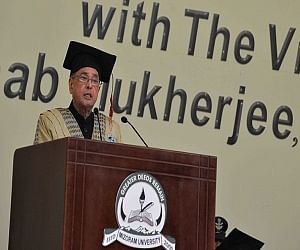
Urging law students to study the Constitution well, President Pranab Mukherjee here on Sunday asked them to be the change that they seek through participation in all matters relating to governance and the state.
Addressing the 24th Annual Convocation of National Law School of India University (NLSIU) here, the President urged the students to study the Constitution well, understand democratic institution and process under it and analyse the choices that were made to build the country what it is today.
The Constituent Assembly which drafted the Constitution represented the Indian population.
India has one of the finest constitutions in the world the driving principle of which is a compact between state and citizen, a powerful public-private partnership nurtured by justice, liberty and equality.
Mukherjee said the Constitution represented a second liberation, this time from the stranglehold of traditional inequality in gender, caste, community along with other fetters that had chained the country of too long, reported PTI.
"Therefore, when on the November 29, 1949 in the Constituent Assembly of India, the members adopted solemnly and it is not a few hundred members of the Constituent Assembly but it is the people of India after 190 years of colonial rule for the first time adopted a legislation.
Adopted and gave it to themselves.
"Therefore, the author of the Constitution is not any individual nor a group of individuals not merely the Constituent Assembly members but the people of India who have solemnly affirmed India into a sovereign democratic republic and to give it to themselves equality, liberty and justice," he said.
During the convocation, the President also gave 45 medals to 20 meritorious students and expressed happiness that most of the medals have been won by girl students passing out from the university.
Terming the students as the brightest young minds of our country, he asked them to help policy makers to make the right policies. The President said a democracy cannot be healthy without informed participation.
"It is just not merely an exercise to give vote, to choose rulers through periodical elections. It is much more.
It requires...your participation in all matters affecting the state. You cannot remain a bystander and expect others to do it for you," he said.
Addressing the 24th Annual Convocation of National Law School of India University (NLSIU) here, the President urged the students to study the Constitution well, understand democratic institution and process under it and analyse the choices that were made to build the country what it is today.
The Constituent Assembly which drafted the Constitution represented the Indian population.
India has one of the finest constitutions in the world the driving principle of which is a compact between state and citizen, a powerful public-private partnership nurtured by justice, liberty and equality.
Mukherjee said the Constitution represented a second liberation, this time from the stranglehold of traditional inequality in gender, caste, community along with other fetters that had chained the country of too long, reported PTI.
"Therefore, when on the November 29, 1949 in the Constituent Assembly of India, the members adopted solemnly and it is not a few hundred members of the Constituent Assembly but it is the people of India after 190 years of colonial rule for the first time adopted a legislation.
Adopted and gave it to themselves.
"Therefore, the author of the Constitution is not any individual nor a group of individuals not merely the Constituent Assembly members but the people of India who have solemnly affirmed India into a sovereign democratic republic and to give it to themselves equality, liberty and justice," he said.
During the convocation, the President also gave 45 medals to 20 meritorious students and expressed happiness that most of the medals have been won by girl students passing out from the university.
Terming the students as the brightest young minds of our country, he asked them to help policy makers to make the right policies. The President said a democracy cannot be healthy without informed participation.
"It is just not merely an exercise to give vote, to choose rulers through periodical elections. It is much more.
It requires...your participation in all matters affecting the state. You cannot remain a bystander and expect others to do it for you," he said.









